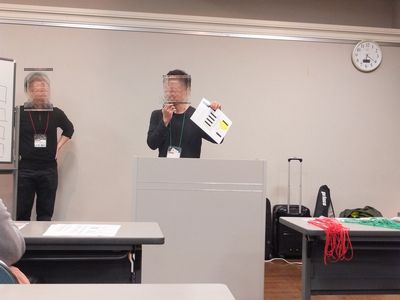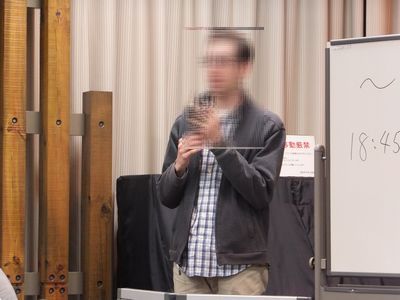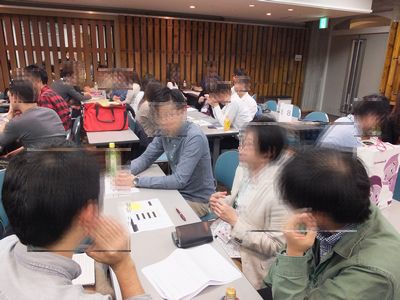第161回 WORKSHOP報告(11月4日) / 参加者60名
1. マテリアルの紹介 Mさん

2. マテリアルの紹介 J先生

3.ディスカッション中の様子

:::::::::::::::::::::::::::::::::::::::::::::::::::::::::::::::::::::::::::::::
《 今回のworkshop 》
○workshop参加人数:56名(うち新人の方:10名)
○【前半】:Imagine you are the owner of a cafe.
○【後半】:What changes to the workplace could be good for Japan and its people?
:::::::::::::::::::::::::::::::::::::::::::::::::::::::::::::::::::::::::::::::::
みなさまこんにちは、E’s club幹事のKです。
11月4日(土)開催の第161回workshopの詳細をお送りいたします。
今回は新たなネイティブ講師をお迎えしてのworkshopとなります。
新講師はALTとして教育経験をお持ちのJ先生です。
J先生には後半のマテリアルをご作成いただきました。
前半のマテリアルはMさんにご作成いただきました。
今回はカフェのオーナーになって新しい飲み物を考案するワークを行います。
[今週のマテリアル]
≪FIRST HALF≫
Imagine you are the owner of a cafe.
The business is going very well but you heard that another cafe is opening soon near yours.
You don’t want to lose the customers.
So, you’ve decided to create a new beverage to attract the customers!
Here’s what you need to do in a team ( -6:45):
1. Name the beverage.
2. Choose up to 4 ingredients. Any ingredients are welcomed and you can also refer to the examples.
3. Decide hot or cold.
Please do a presentation in front of everybody in the room (1min max /team from 6:45 – ):
1. The name of the beverage.
2. The recipe.
3. The sales point.
One person can represent the team while all the members of the team can join a presentation.
Example:
The name of the beverage; The hot summer in the winter!
The recipe; Hot cocoa, Whipped cream, rainbow sprinkles and Watermelon syrup.
The sales point; You can dream about hot summer while you are enjoying hot cocoa in the winter!
Timeline:
6:20 – 6:45 Discussion
6:45 – 7:00 Presentation (1min max /team)
Thank you!
≪LATTER HALF≫
Agenda
What changes to the workplace could be good for Japan and its people?
Questions
1. Have you experienced overwork from school, part-time jobs, or full-time jobs?
2. What are the benefits of longer work times? What are the benefits of shorter work times?
3. Why do many people stay at work past their finish time?
4. Have you heard the phrase “Hatarakikata kaikaku”?
5. Why do you think “Premium Friday” (having employees leave early on the first Friday of the month) isn’t being used?
6. The article says, “deep-seated norms in Japanese culture, such as the spiritual value placed on effort and sacrifice, encourage long work hours.” What do you think of this? Should this value change? Can Japan reduce the pressure to work long hours but keep this cultural value?
7. What can be done with your workplace, school, or self-study to reduce inefficient practices?
Phrases
has entered the lexicon – has become something a word people say and understand
catch-all – a phrase that is used for many situations
a thorn in its side – a source of pain
telework – work from a place other than the office
References
http://www.bbc.com/capital/story/20170903-can-cutting-work-hours-solve-japans-productivity-puzzle
Can cutting hours solve Japan’s productivity puzzle?
Law makers and companies are aiming for shorter hours and a better work-life balance for Japanese people, in an attempt to solve a national productivity crisis
By Rochelle Kopp
4 September 2017
The Japanese government is hoping a single phrase can overhaul its economy and stop its salarymen and women from working themselves to death. Hatarakikata kaikaku or “work style reform” is an urgent bid to tackle a workplace culture so punishing that the word karoshi, or dying from overwork, has entered the lexicon.
The phrase, promoted recently by Prime Minister Shinzō Abe, is a catch-all for cutting overtime, improved work-life balance, and better use of female and older workers’ skills. Used informally for years, hatarakikata kaikaku became a national slogan in August 2016, after Abe appointed a Cabinet minister devoted to the topic.
Japan’s work culture is known for being so punishing that the word karoshi, or dying from overwork, has entered the lexicon (Credit: Getty Images)
A workplace culture of long hours and rigid hierarchies that served the country well during its high growth years in the 1960s, 70s and 80s has become a thorn in its side. The country’s productivity statistics have languished at the bottom of the G7 and well below the OECD [Organization for Economic Cooperation and Development] average. And with an ageing and shrinking workforce, Japan’s only hope for economic growth (other than immigration at a scale that would not be supported by the Japanese public) lies in increasing productivity.
At the behest of the government, many businesses have been cracking down on overtime
At the behest of the government, many businesses have been cracking down on overtime, implementing hatarakikata kaikaku by forcing employees to leave earlier, even turning out the lights in the office at a certain time, or requiring employees to get advance permission for working late.
Other changes include enabling employees to telework, promoting women in the workplace, and offering support to working parents such as reduced hour work schedules. In a particularly Japanese touch, one major company is even putting notes at the bottom of emails, requesting forgiveness in advance for delayed responses due to shortened hours.
Creating a slogan to rally people around a cause has long been popular in Japan (Credit: Getty Images)
Creating a slogan to rally people around a cause has long been popular in Japan, both within companies and nationally.In 2005, the government launched a campaign known as “Cool Biz”, which encouraged firms to use less air conditioning and to allow employees to dress more casually during the summer months. It was a success, and has been widely adopted, as anyone who has sweated through a meeting in Japan in August can attest.
On the other hand, the recent attempt to have companies let their employees off work early on the last Friday of the month, dubbed Premium Friday, appears to be a dismal failure. A survey after the first such day this past February showed that only 3.7% of employees actually left work early, and enthusiasm appears to have fallen further since then.
So how effective is work style reform likely to be? One recent survey shows that larger companies are doing more to make changes, while smaller firms, already stretched for staffing and resources, and less likely to benefit from a PR boost, are less enthusiastic.
Another difficulty lies in the fact that deep-seated norms in Japanese culture, such as the spiritual value placed on effort and sacrifice, encourage long work hours. The traditional Japanese human resource practices that support a very long working day and value only those employees who work late are not likely to change quickly.
Deep-seated norms in Japanese culture, such as the spiritual value placed on effort and sacrifice, encourage long work hours
Companies are also reluctant to make the investments in technology that would improve productivity and enable work-from-anywhere approaches. And it may be difficult to make major changes in work styles without first changing the legal infrastructure around employment. To discourage abusive practices such as requiring employees to work unpaid overtime, the government would need to step up its current lax enforcement of labour regulations, and there are no signs of that happening any time soon.
Many employees are highly skeptical of the hoopla around work style reform. Some have even twisted the slogan to hatarakasekata kaikaku – a change of a few syllables that alters the meaning to “force us to work more reform.”
In a recent survey of over 5000 employees, 85.8% reported that work style reform was something that they had heard about in the media or from other companies, but that their own firm was not doing anything about it. Moreover, employees are concerned that the efforts they do see are not hitting the mark. For example, many companies clamp down on overtime without doing anything to change the amount of work, which simply results in people showing up to work early, working through lunch, or surreptitiously taking work home in order to get their jobs done.
(Credit: Getty Images)
Hatarakikata kaikaku is a catch-all for cutting overtime, improving work-life balance, and better use of female and older workers’ skills (Credit: Getty Images)
For work styles to truly change, Japanese companies will have to address the inefficient work practices at the root of long hours and low productivity: too many meetings; too much paperwork, and intense micromanagement from supervisors. These are the types of everyday working practices that can easily be seen as inevitable by those who have never operated in any other way.
The campaign may not yet be a success in Japan, but it is an admirable attempt to get people to rethink their basic assumptions about how they do their jobs. And with productivity rates declining in many advanced economies including the U.S., U.K. and Germany, it’s also an idea others could learn from.
***********************************************************
私たちと一緒に英語コミュニケーション能力を鍛えませんか?
ご興味を持たれた方は、
入会申込フォーム
https://english-speaking-club.com/cms/?page_id=93
よりお申し込みください。お待ちしています!
***********************************************************